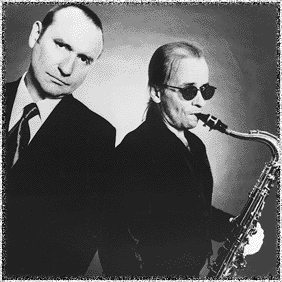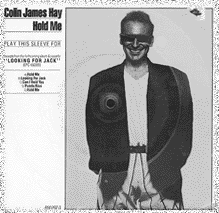 |
| Back From Their Coffee Break |
| by David Richards |

|
Funny thing, the record business; things are not always what they seem. Back in 1982 the head of Epic Records suggested that the company take a chance on an unknown Australian group called Men At Work. People at Epic were skeptical. Sure Air Supply had worked, but big bands out of Australia were few and far between once you got past Rick Springfield (who hadn't lived down under for years by the time he hit in 1981 with "Jesse's Girl"). |
|
Epic was much more excited about a new album from former Motown star Michael Jackson. After all, he had hit number one twice in 1979.
And a few years later, when the dust settled, the naysayers had been right, sort of.
Jackson's new album was Thriller, the best selling album ever issued before or since. But in between there, like some sort of Roy Orbison before the Beatles, the debut from Men At Work snuck in and became the most successful debut album ever, a record that stood until the "Tiffany of the North" broke it a couple of years ago. Business as Usual went to number one for 15 weeks, had two number one charted singles, and several other radio hits. For a whole generation of kids in America Men At Work were it. Legions of fans memorized the entire album, puzzling over Vegemite and being in a den in Bombay. Thanks to clever and fun videos they ruled the airwaves at MTV, and thanks to clever and hum-able melodies they ruled the airwaves on the radio. A follow-up album, Cargo, went to number three and spun off several more hits. They seemed unstoppable, but then - nothing, silence. It was not until two years after Cargo (an eternity back then) that Two Hearts was released. The first single barely made it into the top 40; the album did not. As suddenly as they came Men At Work were over. But a couple of years ago two very synchronistic things happened. One, members of the band were invited to play Brazil in a series of concerts and, two, their old record company issued a best-of that sold better than anyone could have hoped it would. The result is the recently released Brazil album, a live souvenir from their travels in Brazil in 1996. The album showcases the band's excellent songs that still stand up today. The whole Brazil tour was itself a fortuitous accident, Colin Hay, the band's lead singer, remembers. "Greg (Ham) and I had been talking about doing a tour together, trying to come up with some way to initiate working together again. We wanted to go out and play as Men At Work. We knew we wanted to go out, but we were trying to work out where. As it happened, just after we had decided to really start thinking about the tour, a friend of mine called up and said he knew a promoter in Brazil who had asked him if we wanted to go on tour." The two had talked to other band members about re-forming, but nothing had ever worked out. There is a long history of bad blood within the band, not surprising due to their meteoric rise to fame. Hay and Ham had not kept close contact with each other, but had even less contact with other band members. After Cargo was done, Hay remembers, he had gotten fed up with Drummer Jerry Speiser. Bass player John Rees was Speiser's friend, and so when Hay asked Speiser to leave Rees went with him. The band was down to three when they went to work on Two Hearts, but after that was done Stryker and Ham both left, leaving Hay by himself, and effectively ending the band. When it came time to tour again Hay and Ham decided to put together a new band rather than deal with old demons. Hay and Ham did not have it in mind that they were going to Brazil to record a live album. They saw it more as a way to get back into the swing of things. But as Hay recalls, "It didn't take much to take down a portable recorder and record some shows. And I'm glad we did. They were fantastic, and the Brazilian audiences were into it. The audiences were between five and ten thousand each night. Afterwards we realized how good it was. Especially the show in Sao Paulo. We ended up using most of that show for the album." It was far from a simple one-off reunion concert. The band played 17 shows in Brazil and then several others, including a night at the House of Blues in Los Angeles. "Los Angeles was really good. We were originally going to do more (in the United States) but it was difficult to get promoters to get excited about it." In those days, before the success of the Rewind tour, many promoters felt that there was not an audience out there for the band. Now things are different. The band plans to tour in November across the US, playing both coasts and several dates in the Midwest. They also plan to open, ironically enough, for the second leg of the Culture Club Rewind Tour. Hay finds it interesting that Culture Club and Company have done so well, but is unsure how Men At Work will fit in. "I don't feel really part of that. We're going to play old songs, and of course it will be retrospective. But for us it is really a way of discovering if we want to do more, if we want to go back into the studio and record new stuff. We haven't time yet to go back and form a permanent band, but if this tour jells right things could turn around for the band. It depends on whether we come up with songs. I'm not going to put out crap." |
|
A new album from a reconstituted Men At Work would have to take a back seat somewhat to Hay's solo career. After Two Hearts he gave Epic Looking for Jack, his first solo album. Despite warm reviews and initial success it quickly sank on the charts. A follow-up for MCA fell between the cracks as well. Since then he has done three more albums, released outside the US. This fall he finally gets to issue a new album here in the States on Farron Records. When asked about the difficulties of getting his songs heard in the US Hay is philosophical. He knows that his style of music is no longer in style. |
 |
|
But he has high hopes for going the independent route. "You get lost at bigger companies, there's so much manchinery. And if you look at bands that have come up over the past 10 years, they have all done so through the independent route. No one signs a band anymore unless they already have records out--at least nobody at the big companies."
I ask him about the MTV Video Awards, which are on the TV as we speak. I recall how they ruled the airwaves during the birth of MTV. "Yeah - MTV was different then. It was much more adventurous. It's settled down now. Actually there's a funny story. A friend of mine wanted to film me in concert, playing songs and talking about them. I guess everyone does that these days. Anyway, he was using the film to shop around a series idea to MTV. They liked it a lot and wanted to do the show, but told him that they couldn't use my concert because I didn't fit the demographic." Ironically, MTV may have to eat crow. The new album has been getting great reviews and the band is gearing up for the fall tour. Meanwhile Hay is happy knowing that he feels good about what he is doing. He is not obsessed with maintaining some fantastic level of fame. "As long as I think its good, that's what matters." Seems like business as usual again. |
 |
 |
 |
 |
|
